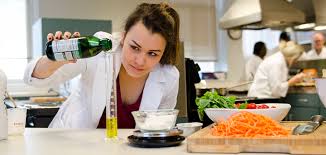
"The kitchen's a laboratory, and everything that happens there has to do with science. It's biology, chemistry, physics. Yes, there's history. Yes, there's artistry. Yes, to all of that. But what happens there, what actually happens to the food, is all science." Alton Brown
Current Unit
Useful Websites and Resources
Course Description
Food Science is designed to reinforce and enhance the student’s knowledge of scientific principles and processes through the study of foods and nutrition. Hands-on laboratory experiences are a required part of this class. This class fulfills the third year science requirement. This is not a Regents course. This is not a cooking instruction class. Course topics will include:
- Food Science and Its Relevance to Global Society
- Research Practices in Food Science
- Concepts of Physical Sciences Relevant to Food Science
- Concepts of Life Sciences Relevant to Food Science
- Water
- Carbohydrates
- Lipids
- Proteins
- Vitamins and Minerals
- Food Industry Careers
- Introduction to Microorganisms
- Food Preservation
- Food Safety
- Technological Advances in Food Science
Grading
Participation / Classwork / Homework 20%
Laboratory Experiences and Reports/Projects 50%
Tests 30%
Students may miss one laboratory experience per quarter. Labs CANNOT be made up! Each lab experience is 2-3 days long. If a student misses either the hands-on lab, or the lab evaluation, the lab may be graded as an assignment rather than as a lab, or the student may be required to complete an alternate modified assignment in order to earn the lab grade. If a student misses both the hands-on lab experience AND the lab evaluation, and has already missed a lab experience that quarter, the student WILL be required to complete an alternate assignment which will be equivalent to the work expected in a total lab experience in order to earn the missing lab grade.
Late assignments will have 10 points deducted from the assignment grade.
Supplies
Students should have a binder for study guides and handouts, a green folder to use in class for storage of labs, and a supply of loose-leaf paper, as well as a blue or black pen.